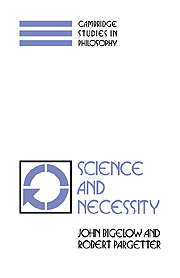Preface
Published online by Cambridge University Press: 16 September 2009
Summary
In science, observations are important. They reveal to us the properties and relations of particular objects. Also important are unobserved, theoretical entities with their properties and relations. But logic is important too, and so is mathematics. Any scientific realism worth its salt must give due weight to mathematics and logic, as well as to observations.
In this book we argue for mathematical realism. Broadly speaking, we argue for a brand of Platonism, but a scientific Platonism rather than an otherworldly mysticism of the sort which is often conjured up when Plato is called to mind. Mathematics can be understood realistically, we argue, if it is seen to be the study of universals, of properties and relations, of patterns and structures, the kinds of things which can be in several places at once.
Logic too, we argue, can best be understood, in harmony with scientific realism, using the raw materials furnished by a scientific Platonism. Logic is concerned with the validity of arguments; and an argument is valid when the conclusion is a necessary consequence of the premisses, in other words when it is not possible for the conclusion to be false unless the premisses are mistaken. Consequently, any explanation of validity depends on the modal concepts of necessity and possibility. A scientific realist should be a modal realist, a realist about necessities and possibilities, as well as about the other things in science. The key to modal realism, we argue, is to be found in realism about universals.
- Type
- Chapter
- Information
- Science and Necessity , pp. vii - ixPublisher: Cambridge University PressPrint publication year: 1991



